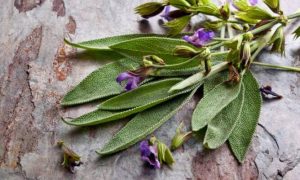Benefits of Salvia, the Plant for Women


Written and verified by the psychologist Valeria Sabater
The benefits of salvia are innumerable. This medicinal plant’s name comes from the Latin salvare (to cure). It is one of the most fitting natural resources for women’s health. Salvia eases the symptoms of menstruation and menopause and it reduces inflammation, pain, and the retention of liquids. It also has cardiovascular benefits.
Herbal medicine has a long tradition throughout our history. The world of plants, from a chemical standpoint, still safeguards great mysteries that medicine has tried to reveal. This has been going on almost since the beginning of civilization. Plants such as ginseng, Saint-John’s-Wort, ginkgo biloba, and any type of tea will have interesting pharmacological effects. If the benefits of salvia and others are clear and we take them correctly they can have positive effects (as we already know) on our well-being.
See also: St-Johns-Wort
Salvia has been used in medicine for many years. From mental disorders to gastrointestinal discomfort. Science has backed up some of its medical applications.
It is true that plants alone cannot cure diseases or psychological maladies. Thanks to their enzymes, essential oils, flavonoids, minerals, etc., they can optimize certain processes. They relax us, stimulate certain neurotransmitters, facilitate blood circulation, activate the immune system, and have other effects. Using them correctly can serve as a good complementary therapy for certain conditions.
So, among all offerings nature grants us for our well-being, salvia is one of the most interesting. Let’s take a look at some more data.

The interesting benefits of salvia
The magazine “Medical News Today” reports that a variety of salvia’s benefits have been scientifically demonstrated. Of course, it’s worth noting that the mint family of plants is very broad. Regardless, up until now, there is a lot of work revealing the nature of two important types of salvia: Salvia Officinalis and S. Lavandulaefolia (the two most common types).
Just as the title of this article states, salvia has traditionally been an almost daily resource in the lives of women. In ancient Greece, for example these plants were used for cosmetic, culinary, and, above all, therapeutic purposes. Its tea, which is slightly astringent but pleasant, is rich in countless vitamins and minerals. It also has other components able to reduce inflammation and regulate female hormones.
See Also: Tea
Salvia and menstruation
Among the most well-known benefits of salvia is its use in easing premenstrual symptom. What it does is reduce pain, swelling, headache, etc. In the same way, it is also effective for reducing the severity of symptoms associated with menopause. This is because its essential oil has a slight level of estrogenic activity.
Inflammation
The University of Vienna published a very interesting study in 2013 about salvia. This plant has been shown to have very useful anti-inflammatory and antimicrobial properties.
Something as simple as drinking between one and two cups of salvia tea per day can be very beneficial. It can reduce our abdominal inflammation, reduce the chances of getting a urinary tract infection, and can also treat gingivitis.
Salvia and depression
Salvia tea is also often known for its ability to improve our emotional state. The presence of antioxidants such as diosmetin, apigenin, and luteolin are excellent for reducing (not curing) the symptoms associated with depression.

The memory plant
Various studies, such as the one done at the University of Oxford, have made an enlightening conclusion. Salvia extract can increase your cognitive abilities. As of yet, we do not know the correct dosage needed for a noticeable effect. Even so, this research recommends the consumption of salvia extract or of the raw plant itself.
The reason for salvia’s improvement in memory is cholinesterase. This is an enzyme which regulates the catalyzation of hydrolisis of acetylcholine. A low level of this neurotransmitter is associated with less cognitive agility.
See Also: Memory
It regulates the T3 hormone
The T3 hormone is Triiodothyronine. This is a thyroid hormone related to important physiological and metabolic processes. People who suffer from hypothyrodism will know that this condition arises when people suffer from low levels of the T3 and T4 hormones.
On the other hand, scientists have been able to demonstrate that when a woman enters menopause, it’s common to have a deficit of this hormone. Not only is there more risk of suffering thyroid problems. Her levels of Vitamin D will also reduce. These are essential for bone health.
Regularly drinking salvia tea can help us. If we keep a healthy diet and we don’t ignore medical checkups, this plant can help us regulate our hormones.

In conclusion, the benefits of salvia are more than just interesting. Its medicinal properties and its rich nutritional value make it a natural resource that is worth keeping at home. Let’s also remember that we have to take it in a balanced and moderate way (1 or 2 cups per day). Also, remember that salvia is not good for pregnant women or those who are lactating, nor for people with renal diseases.
Let’s make good use of this plant, the one Pliny the elder defined as the remedy for well-being.
The benefits of salvia are innumerable. This medicinal plant’s name comes from the Latin salvare (to cure). It is one of the most fitting natural resources for women’s health. Salvia eases the symptoms of menstruation and menopause and it reduces inflammation, pain, and the retention of liquids. It also has cardiovascular benefits.
Herbal medicine has a long tradition throughout our history. The world of plants, from a chemical standpoint, still safeguards great mysteries that medicine has tried to reveal. This has been going on almost since the beginning of civilization. Plants such as ginseng, Saint-John’s-Wort, ginkgo biloba, and any type of tea will have interesting pharmacological effects. If the benefits of salvia and others are clear and we take them correctly they can have positive effects (as we already know) on our well-being.
See also: St-Johns-Wort
Salvia has been used in medicine for many years. From mental disorders to gastrointestinal discomfort. Science has backed up some of its medical applications.
It is true that plants alone cannot cure diseases or psychological maladies. Thanks to their enzymes, essential oils, flavonoids, minerals, etc., they can optimize certain processes. They relax us, stimulate certain neurotransmitters, facilitate blood circulation, activate the immune system, and have other effects. Using them correctly can serve as a good complementary therapy for certain conditions.
So, among all offerings nature grants us for our well-being, salvia is one of the most interesting. Let’s take a look at some more data.

The interesting benefits of salvia
The magazine “Medical News Today” reports that a variety of salvia’s benefits have been scientifically demonstrated. Of course, it’s worth noting that the mint family of plants is very broad. Regardless, up until now, there is a lot of work revealing the nature of two important types of salvia: Salvia Officinalis and S. Lavandulaefolia (the two most common types).
Just as the title of this article states, salvia has traditionally been an almost daily resource in the lives of women. In ancient Greece, for example these plants were used for cosmetic, culinary, and, above all, therapeutic purposes. Its tea, which is slightly astringent but pleasant, is rich in countless vitamins and minerals. It also has other components able to reduce inflammation and regulate female hormones.
See Also: Tea
Salvia and menstruation
Among the most well-known benefits of salvia is its use in easing premenstrual symptom. What it does is reduce pain, swelling, headache, etc. In the same way, it is also effective for reducing the severity of symptoms associated with menopause. This is because its essential oil has a slight level of estrogenic activity.
Inflammation
The University of Vienna published a very interesting study in 2013 about salvia. This plant has been shown to have very useful anti-inflammatory and antimicrobial properties.
Something as simple as drinking between one and two cups of salvia tea per day can be very beneficial. It can reduce our abdominal inflammation, reduce the chances of getting a urinary tract infection, and can also treat gingivitis.
Salvia and depression
Salvia tea is also often known for its ability to improve our emotional state. The presence of antioxidants such as diosmetin, apigenin, and luteolin are excellent for reducing (not curing) the symptoms associated with depression.

The memory plant
Various studies, such as the one done at the University of Oxford, have made an enlightening conclusion. Salvia extract can increase your cognitive abilities. As of yet, we do not know the correct dosage needed for a noticeable effect. Even so, this research recommends the consumption of salvia extract or of the raw plant itself.
The reason for salvia’s improvement in memory is cholinesterase. This is an enzyme which regulates the catalyzation of hydrolisis of acetylcholine. A low level of this neurotransmitter is associated with less cognitive agility.
See Also: Memory
It regulates the T3 hormone
The T3 hormone is Triiodothyronine. This is a thyroid hormone related to important physiological and metabolic processes. People who suffer from hypothyrodism will know that this condition arises when people suffer from low levels of the T3 and T4 hormones.
On the other hand, scientists have been able to demonstrate that when a woman enters menopause, it’s common to have a deficit of this hormone. Not only is there more risk of suffering thyroid problems. Her levels of Vitamin D will also reduce. These are essential for bone health.
Regularly drinking salvia tea can help us. If we keep a healthy diet and we don’t ignore medical checkups, this plant can help us regulate our hormones.

In conclusion, the benefits of salvia are more than just interesting. Its medicinal properties and its rich nutritional value make it a natural resource that is worth keeping at home. Let’s also remember that we have to take it in a balanced and moderate way (1 or 2 cups per day). Also, remember that salvia is not good for pregnant women or those who are lactating, nor for people with renal diseases.
Let’s make good use of this plant, the one Pliny the elder defined as the remedy for well-being.
All cited sources were thoroughly reviewed by our team to ensure their quality, reliability, currency, and validity. The bibliography of this article was considered reliable and of academic or scientific accuracy.
- Abdnezhad, R., Simbar, M., Sheikhan, Z., Mojab, F., & Nasiri, M. (2019). Salvia officinalis reduces the severity of the premenstrual syndrome. Complementary medicine research, 26(1), 39-46. https://www.karger.com/Article/Abstract/490104
- Alrezaki, A., Aldawood, N., Alanazi, S., Arafah, M., Fabova, Z., Badjah, Y., … & Harrath, A. H. (2021). Consumption of sage (Salvia officinalis) promotes ovarian function by stimulating estradiol hormone release and controlling folliculogenesis, steroidogenesis, and autophagy. Journal of King Saud University-Science, 33(2), 101319. https://www.sciencedirect.com/science/article/pii/S1018364720304328
- Brindisi, M., Bouzidi, C., Frattaruolo, L., Loizzo, M. R., Cappello, M. S., Dugay, A., Deguin, B., Lauria, G., Cappello, A. R., & Tundis, R. (2021). New Insights into the Antioxidant and Anti-Inflammatory Effects of Italian Salvia officinalis Leaf and Flower Extracts in Lipopolysaccharide and Tumor-Mediated Inflammation Models. Antioxidants (Basel, Switzerland), 10(2), 311. https://www.ncbi.nlm.nih.gov/pmc/articles/PMC7922507/
- Hamidpour, M., Hamidpour, R., Hamidpour, S., & Shahlari, M. (2014). Chemistry, Pharmacology, and Medicinal Property of Sage (Salvia) to Prevent and Cure Illnesses such as Obesity, Diabetes, Depression, Dementia, Lupus, Autism, Heart Disease, and Cancer. Journal of traditional and complementary medicine, 4(2), 82–88. https://www.ncbi.nlm.nih.gov/pmc/articles/PMC4003706/
- Han, S. H., Hur, M. H., Buckle, J., Choi, J., & Lee, M. S. (2006). Effect of aromatherapy on symptoms of dysmenorrhea in college students: A randomized placebo-controlled clinical trial. Journal of alternative and complementary medicine (New York, N.Y.), 12(6), 535–541. https://pubmed.ncbi.nlm.nih.gov/16884344/
- Lopresti A. L. (2017). Salvia (Sage): A Review of its Potential Cognitive-Enhancing and Protective Effects. Drugs in R&D, 17(1), 53–64. https://www.ncbi.nlm.nih.gov/pmc/articles/PMC5318325/
- Maliki, I., Es-Safi, I., El Moussaoui, A., Mechchate, H., El Majdoub, Y. O., Bouymajane, A., Cacciola, F., Mondello, L., & Elbadaoui, K. (2021). Salvia officinalis and Lippia triphylla: Chemical characterization and evaluation of antidepressant-like activity. Journal of pharmaceutical and biomedical analysis, 203, 114207. https://pubmed.ncbi.nlm.nih.gov/34153940/
- Margetts, G., Kleidonas, S., Zaibi, N. S., Zaibi, M. S., & Edwards, K. D. (2022). Evidence for anti-inflammatory effects and modulation of neurotransmitter metabolism by Salvia officinalis L. BMC complementary medicine and therapies, 22(1), 131. https://www.ncbi.nlm.nih.gov/pmc/articles/PMC9101933/
- Sabry, M. M., Abdel-Rahman, R. F., El-Shenawy, S. M., Hassan, A. M., & El-Gayed, S. H. (2022). Estrogenic activity of Sage (Salvia officinalis L.) aerial parts and its isolated ferulic acid in immature ovariectomized female rats. Journal of ethnopharmacology, 282, 114579. https://pubmed.ncbi.nlm.nih.gov/34499963/
- Zeidabadi, A., Yazdanpanahi, Z., Dabbaghmanesh, M. H., Sasani, M. R., Emamghoreishi, M., & Akbarzadeh, M. (2020). The effect of Salvia officinalis extract on symptoms of flushing, night sweat, sleep disorders, and score of forgetfulness in postmenopausal women. Journal of family medicine and primary care, 9(2), 1086–1092. https://pubmed.ncbi.nlm.nih.gov/32318472/
This text is provided for informational purposes only and does not replace consultation with a professional. If in doubt, consult your specialist.







